Sponsored by:
Santa Clara Law Review
Association of American Law School’s Section on Leadership
Santa Clara University School of Law
Institute for Lawyer Leadership Education
The Edwin Heafey Center for Trial and Appellate Advocacy
Santa Clara University School of Law and its Santa Clara Law Review are providing a national forum for the discussion of leadership in the legal profession during these times of great struggle, change and volatility. These unprecedented times require effective and ethical leadership. The Symposium will bring together some leading experts on leadership by lawyers spanning relevant areas such as national health, politics and government, crisis management, law practice, and legal education.
The Honorable Leon Panetta, former U.S. Congressman from California, Secretary of Defense and Director of the Central Intelligence Agency will deliver a keynote address on lawyer leadership in public life.
The 2021 Symposium will feature a series of presentations and panel discussions offered remotely, on Friday, February 26, 2021. Symposium attendance will qualify for 7.25 hours of MCLE credit (including 2 hours of ethics credit) and will be offered without charge or fee.
For more information on the Symposium, please contact the Senior Symposium Editor, Phil Fox at pfox@scu.edu or Professor Donald Polden at dpolden@scu.edu.
Schedule
| 8:00 a.m. (PST) | Welcome
Jenna Anderson, Editor in Chief Phil Fox, Senior Symposium Editor Julianna Cassara, Symposium Editor Santa Clara Law Review |
| 8:05 a.m. |
Remembering Deborah Rhode Dedication of Symposium Colleagues’ Remembrances |
| 8:30 a.m. – 10:30 a.m. | Panel I: Leadership, Lawyers and Practice of Law: Pedagogy and Leading Innovation and Change
Doug Blaze Joan MacLeod Heminway Susan Jones Natalie Jonsson Michael Madison Caitlin (Cat) Moon Mark Michels (Moderator) |
| 10:45 a.m. to 11:45 a.m. | Panel II: Leadership Issues in Legal Education
April Barton Erwin Chemerinsky Jacob Rooksby Donald Polden Lizette Valles (Moderator) |
| 12 noon | Keynote Address: Honorable Leon Panetta, Former Secretary of Defense, Director of CIA and U.S. Congressman from California |
| 1:15 p.m.-3:15 p.m. | Panel III: Leadership and Law: Ethics, Paradoxes and Pedagogy
Ann Skeet Gordon Smith Susan Sturm Kellye Testy William Treanor Jacquelyn Silva (Moderator) |
| 3:30 p.m. to 4:45 p.m. | Panel IV: Leadership Development Programs and Initiatives
Lee Fisher Garry Jenkins Aric Short Leah Jackson Teague Nicole Yuvienco (Moderator) |
| 4:45 p.m. | Concluding Remarks
Jenna Anderson Donald J. Polden |
Speaker Bios:
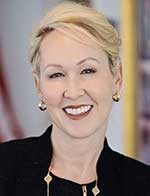 April M. Barton joined Duquesne University School of Law in July of 2019 as its 13th dean. Under her leadership, the Law School continues to excel in bar passage, being recognized as a national leader in bar preparation, and has brought in one of the strongest classes in recent memory, with a two-point across the board increase in LSAT metrics. The Law School remains grounded in its Catholic and Spiritan Mission while embracing a new shared vision for the future focused on three pillars of interdisciplinary learning, leadership development, and community well-being with an emphasis on creating a culture of inclusion where all can flourish. These three pillars continue to guide Duquesne’s innovation and path forward.
April M. Barton joined Duquesne University School of Law in July of 2019 as its 13th dean. Under her leadership, the Law School continues to excel in bar passage, being recognized as a national leader in bar preparation, and has brought in one of the strongest classes in recent memory, with a two-point across the board increase in LSAT metrics. The Law School remains grounded in its Catholic and Spiritan Mission while embracing a new shared vision for the future focused on three pillars of interdisciplinary learning, leadership development, and community well-being with an emphasis on creating a culture of inclusion where all can flourish. These three pillars continue to guide Duquesne’s innovation and path forward.
She previously held various positions at Villanova University Charles Widger School of Law, most recently as Associate Dean for Academic Affairs. Barton successfully launched initiatives on leadership development, including a student Lawyers as Leaders program and a new course, Leadership and Management Skills for Lawyers. At Villanova, Barton taught courses in administrative agency rulemaking, computer law, the First Amendment and regulation in cyberspace, and digital law. She previously served as the director of the JD/MBA and JD/MPA joint degree programs.
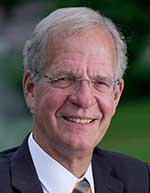 Douglas A. Blaze is presently serving as the Interim Dean at the University of Tennessee College of Law. He joined the Tennessee in 1993 as director of clinical programs. He served as dean of the College of Law from 2008 to 2015 until he returned to full-time teaching and served as director of the college’s Institute for Professional Leadership, which he co-founded. He has also served as director of the Center for Advocacy and Dispute Resolution and interim associate dean for academic affairs. Before Tennessee, Blaze was a member of the law faculty at Arizona State University and helped establish a community-based legal service clinic. He also practiced with the firm of Fennemore Craig in Phoenix, where his practice involved commercial and tort litigation.
Douglas A. Blaze is presently serving as the Interim Dean at the University of Tennessee College of Law. He joined the Tennessee in 1993 as director of clinical programs. He served as dean of the College of Law from 2008 to 2015 until he returned to full-time teaching and served as director of the college’s Institute for Professional Leadership, which he co-founded. He has also served as director of the Center for Advocacy and Dispute Resolution and interim associate dean for academic affairs. Before Tennessee, Blaze was a member of the law faculty at Arizona State University and helped establish a community-based legal service clinic. He also practiced with the firm of Fennemore Craig in Phoenix, where his practice involved commercial and tort litigation.
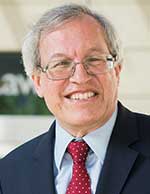 Erwin Chemerinsky became the 13th Dean of Berkeley Law on July 1, 2017, when he joined the faculty as the Jesse H. Choper Distinguished Professor of Law. Prior to assuming this position, from 2008-2017, he was the founding Dean and Distinguished Professor of Law, and Raymond Pryke Professor of First Amendment Law, at University of California, Irvine School of Law, with a joint appointment in Political Science. Before that he was the Alston and Bird Professor of Law and Political Science at Duke University from 2004-2008, and from 1983-2004 was a professor at the University of Southern California Law School, including as the Sydney M. Irmas Professor of Public Interest Law, Legal Ethics, and Political Science. He also has taught at DePaul College of Law and UCLA Law School.
Erwin Chemerinsky became the 13th Dean of Berkeley Law on July 1, 2017, when he joined the faculty as the Jesse H. Choper Distinguished Professor of Law. Prior to assuming this position, from 2008-2017, he was the founding Dean and Distinguished Professor of Law, and Raymond Pryke Professor of First Amendment Law, at University of California, Irvine School of Law, with a joint appointment in Political Science. Before that he was the Alston and Bird Professor of Law and Political Science at Duke University from 2004-2008, and from 1983-2004 was a professor at the University of Southern California Law School, including as the Sydney M. Irmas Professor of Public Interest Law, Legal Ethics, and Political Science. He also has taught at DePaul College of Law and UCLA Law School.
He is the author of twelve books, including leading casebooks and treatises about constitutional law, criminal procedure, and federal jurisdiction. He also is the author of more than 250 law review articles. He frequently argues appellate cases, including in the United States Supreme Court.
In 2016, he was named a fellow of the American Academy of Arts and Sciences. In 2017, National Jurist magazine again named Dean Chemerinsky as the most influential person in legal education in the United States.
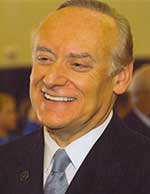 Lee Fisher is the Dean and Joseph C. Hostetler-BakerHostetler Chair in Law at Cleveland-Marshall College of Law at Cleveland State University. Lee Fisher’s diverse career has spanned the private, public, nonprofit, and academic sectors. In addition to serving as Dean, Lee is Senior Fellow, Cleveland State University’s Levin College of Urban Affairs; and Urban Scholar, College of Urban Planning and Public Affairs and the Great Cities Institute, University of Illinois at Chicago.
Lee Fisher is the Dean and Joseph C. Hostetler-BakerHostetler Chair in Law at Cleveland-Marshall College of Law at Cleveland State University. Lee Fisher’s diverse career has spanned the private, public, nonprofit, and academic sectors. In addition to serving as Dean, Lee is Senior Fellow, Cleveland State University’s Levin College of Urban Affairs; and Urban Scholar, College of Urban Planning and Public Affairs and the Great Cities Institute, University of Illinois at Chicago.
Lee served as Ohio Attorney General and was the first Ohio Attorney General to personally argue cases before the U.S. Court of Appeals for the 6th Circuit and the Ohio Supreme Court. In addition to serving as Attorney General, Lee has served as Ohio Lt. Governor; Director, Ohio Department of Development; Chair, Ohio Third Frontier Commission; Chair, Ohio Economic Growth Council; State Senator; and State Representative. Lee is the author of ten Ohio laws, including Ohio’s Hate Crime, Crime Victims Assistance, and Missing Children laws. President Bill Clinton appointed Lee as Chair of the National Commission on Crime Control and Prevention. He is a Life member of the U.S. Court of Appeals for the 6th Circuit Judicial Conference and the Ohio Court of Appeals for the Eighth District Judicial Conference.
Lee is a graduate of Oberlin College and served on the Oberlin College Board of Trustees for 12 years. He earned his law degree from Case Western Reserve University School of Law; he was the first recipient of the School of Law’s Distinguished Recent Graduate Award and was inducted in the School of Law’s Society of Benchers. He earned his Master of Nonprofit Organization (MNO) from the CWRU Mandel Center for Nonprofit Organizations. He is a graduate of a number of leadership education programs including the Center for Creative Leadership’s Leadership at the Peak Program; the Arbinger Institute Outward Mindset Workshop; the Case Western Reserve University Weatherhead School of Management’s Professional Fellows Program, Harvard University’s Program on Negotiation, and Leadership Cleveland (Class of 1984). He was selected as a Chase Public Leadership Fellow at Harvard’s Program for Senior Executives in State and Local Government, and a Case Western University Presidential Fellow, teaching two undergraduate seminars on leadership, innovation, and collaboration.
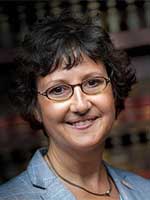 Joan MacLeod Heminway is the Rick Rose Distinguished Professor of Law and Interim Director of the Institute for Professional Leadership at The University of Tennessee College of Law and a fellow of the C. Warren Neel Corporate Governance Center and the Center for the Study of Social Justice at The University of Tennessee, Knoxville. When she joined the College of Law faculty in 2000, Professor Heminway had completed nearly 15 years of corporate transactional legal practice experience, having worked on public offerings, private placements, mergers, acquisitions, dispositions, and restructurings in the Boston office of Skadden, Arps, Slate, Meagher & Flom LLP beginning in 1985. A business finance and governance teacher and scholar, Professor Heminway has participated in the Higher Education Resource Services (HERS) Leadership Institute and the Southeast Conference Academic Leadership Development Program (SEC-ALDP). She is a member of the American Law Institute and Co-Chair of the Chancellor’s Commission for Women at The University of Tennessee, Knoxville. Professor Heminway is licensed to practice in Tennessee (where she currently serves as Immediate Past Chair of the Business Law Section of the Tennessee Bar Association) and Massachusetts (where she is inactive).
Joan MacLeod Heminway is the Rick Rose Distinguished Professor of Law and Interim Director of the Institute for Professional Leadership at The University of Tennessee College of Law and a fellow of the C. Warren Neel Corporate Governance Center and the Center for the Study of Social Justice at The University of Tennessee, Knoxville. When she joined the College of Law faculty in 2000, Professor Heminway had completed nearly 15 years of corporate transactional legal practice experience, having worked on public offerings, private placements, mergers, acquisitions, dispositions, and restructurings in the Boston office of Skadden, Arps, Slate, Meagher & Flom LLP beginning in 1985. A business finance and governance teacher and scholar, Professor Heminway has participated in the Higher Education Resource Services (HERS) Leadership Institute and the Southeast Conference Academic Leadership Development Program (SEC-ALDP). She is a member of the American Law Institute and Co-Chair of the Chancellor’s Commission for Women at The University of Tennessee, Knoxville. Professor Heminway is licensed to practice in Tennessee (where she currently serves as Immediate Past Chair of the Business Law Section of the Tennessee Bar Association) and Massachusetts (where she is inactive).
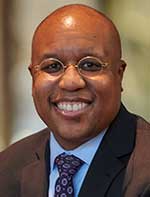 Garry Jenkins is the dean and William S. Pattee Professor of Law at the University of Minnesota Law School. Prior to assuming his current position, he was associate dean for academic affairs and John C. Elam/Vorys Sater Professor of Law at The Ohio State University Moritz College of Law, where he was also director of the Program on Law and Leadership, a leadership education and development initiative that he co-founded.
Garry Jenkins is the dean and William S. Pattee Professor of Law at the University of Minnesota Law School. Prior to assuming his current position, he was associate dean for academic affairs and John C. Elam/Vorys Sater Professor of Law at The Ohio State University Moritz College of Law, where he was also director of the Program on Law and Leadership, a leadership education and development initiative that he co-founded.
Dean Jenkins’s research and teaching interests are in law and philanthropy, corporate governance, and leadership studies. His scholarly articles have been published in leading law reviews and interdisciplinary journals, and his scholarship has been honored for excellence in three different subfields: nonprofit law, global justice, and corporate law.
He earned a B.A. from Haverford College, a master’s degree in public policy from the Harvard Kennedy School, and a J.D. from Harvard Law School, where he served as editor-in-chief of the Harvard Civil Rights-Civil Liberties Law Review. Upon graduation, he clerked for Judge Timothy K. Lewis of the United States Court of Appeals for the 3rd Circuit.
Dean Jenkins currently sits on the governing boards of Haverford College, Law School Admission Council, Equal Justice Works, and the Guthrie Theater. He serves by gubernatorial appointment as one of Minnesota’s commissioners to the Uniform Law Commission.
 Natalie Jonsson is an associate at Kirkland & Ellis LLP. Her practice focuses on representing private equity sponsors and strategic clients in connection with cross-border and domestic mergers, acquisitions, joint ventures, co-investments, equity financings and general corporate governance matters in various industries, including software, financial services, insurance and consumer products.
Natalie Jonsson is an associate at Kirkland & Ellis LLP. Her practice focuses on representing private equity sponsors and strategic clients in connection with cross-border and domestic mergers, acquisitions, joint ventures, co-investments, equity financings and general corporate governance matters in various industries, including software, financial services, insurance and consumer products.
Natalie is a 2018 graduate of Santa Clara University School of Law, where she was named the Mabie Outstanding Law Graduate, Class of 2018. She also served as Editor-in-Chief of the Santa Clara Law Review and was a semi-finalist and the Problem Committee Chair for the Honors Moot Court Internal program.
Natalie earned a B.S. from New York University and worked for several years in the nonprofit sector in New York and Boston prior to completing her law degree. She currently resides in the East Bay with her son, Luke.
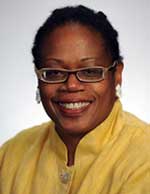 Susan R. Jones is a Professor of Clinical Law and a member of the full-time faculty at The George Washington University Law School. Since 1988 she has been Director and Supervising Attorney of the Small Business & Community Economic Development Clinic (SBCED Clinic). She is an active member of the District of Columbia Bar having served as Vice-Chair to the DC Bar (CED) Pro Bono Project Advisory Committee.
Susan R. Jones is a Professor of Clinical Law and a member of the full-time faculty at The George Washington University Law School. Since 1988 she has been Director and Supervising Attorney of the Small Business & Community Economic Development Clinic (SBCED Clinic). She is an active member of the District of Columbia Bar having served as Vice-Chair to the DC Bar (CED) Pro Bono Project Advisory Committee.
Professor Jones was the 2006 chair of the Association of American Law Schools (AALS) Section on Clinical Legal Education and she served on the executive committee of that section and as chair of the Section on Africa. She was a member of the AALS Standing Committee on Clinical Legal Education and is a former chair of the AALS Section on Poverty Law.
In addition to her work with the AALS, Professor Jones has held numerous leadership positions in the American Bar Association (ABA) service on the governing committee of ABA Forum on Affordable Housing and Community Development Law, editor-in-chief and senior editor of the ABA Journal of Affordable Housing and Community Development Law and co-chair of the Forum’s Legal Educators’ Practice Division. She is a co-founder and past co-chair of the Community Economic Development Committee of the ABA Section on Business Law and she served on the ABA Business Law Education Committee as well as on the ABA Commission on Homelessness and Poverty.
Professor Jones is a Fannie Mae Foundation Fellow, Harvard University Kennedy School of Government (2002) and a member of Leadership Washington (1996). Her scholarly pursuits include numerous published articles in the field of entrepreneurship and the law, small and microbusiness and community economic development.) Professor Jones was awarded Washington Area Lawyers for the Arts Lifetime Achievement Award for distinctive service to the greater Washington, D.C. creative community and for 20 years of service on the WALA Board of Directors.
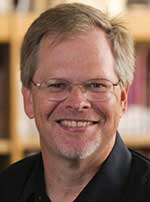 Michael J. Madison is Professor of Law at the University of Pittsburgh School of Law. He is a Senior Scholar with the University of Pittsburgh Institute for Cyber Law, Policy, and Security (Pitt Cyber). At Pitt Law, he is Faculty Director of the Future Law Project and a John E. Murray Faculty Scholar.
Michael J. Madison is Professor of Law at the University of Pittsburgh School of Law. He is a Senior Scholar with the University of Pittsburgh Institute for Cyber Law, Policy, and Security (Pitt Cyber). At Pitt Law, he is Faculty Director of the Future Law Project and a John E. Murray Faculty Scholar.
As a researcher and teacher, Professor Madison focuses on institutions for producing and distributing knowledge, information, creativity, innovation, art, and data. The scope of his writing ranges from the development of research universities to patent history, from the law of fair use and production of conceptual art to legal rules governing data, network security, and the commercial law of computer software. He is the author of more than 50 journal articles and book chapters, the co-author of The Law of Intellectual Property (Wolters Kluwer, 5th edition 2017), and the co-editor of Governing Knowledge Commons (Oxford University Press, 2014) and Governing Medical Knowledge Commons (Cambridge University Press, 2017). Professor Madison is the co-founder of the global research network titled the Workshop on Governing Knowledge Commons and the global law reform platform titled Future Law Works.
His awards and distinctions include the Chancellor’s Distinguished Teaching Award at Pitt, a fellowship from the Educating Tomorrow’s Lawyers project at the Institute for the Advancement of the American Legal System (IAALS) in Denver, and election to membership in the American Law Institute in 2016.
Before becoming a law professor in 1997, he practiced law for nearly 10 years in San Francisco and Silicon Valley.
 Caitlin (“Cat”) Moon teaches in the Program on Law and Innovation (PoLI) at Vanderbilt Law School, where she also serves as the Director of Innovation Design and directs the PoLI Institute (innovatethelaw.com), Vanderbilt Law’s innovation-focused executive education platform. In addition to co-organizing Music City (Nashville) Legal Hackers, Cat co-founded the Summit on Law and Innovation (SoLI), which brings together experts across legal, technology, and other disciplines in collaborative legal innovation projects. She currently teaches Legal Problem Solving, a course in human-centered design for law, as well as Law as a Business, Blockchain and Smart Contracts, Legal Operations, and Leading in Law. Cat also serves on the leadership team of the Medical Innovators Development Program and is on the faculty of Radiological Sciences at Vanderbilt School of Medicine, where she brings cross-disciplinary experience to innovation across medicine and the law. She regularly speaks, facilitates workshops, and coaches individuals globally on the application of human-centered design methods and processes to lead innovation in both the legal profession and legal education. Before joining her alma mater Vanderbilt Law’s faculty, she practiced law for 20 years and still maintains an active law license.
Caitlin (“Cat”) Moon teaches in the Program on Law and Innovation (PoLI) at Vanderbilt Law School, where she also serves as the Director of Innovation Design and directs the PoLI Institute (innovatethelaw.com), Vanderbilt Law’s innovation-focused executive education platform. In addition to co-organizing Music City (Nashville) Legal Hackers, Cat co-founded the Summit on Law and Innovation (SoLI), which brings together experts across legal, technology, and other disciplines in collaborative legal innovation projects. She currently teaches Legal Problem Solving, a course in human-centered design for law, as well as Law as a Business, Blockchain and Smart Contracts, Legal Operations, and Leading in Law. Cat also serves on the leadership team of the Medical Innovators Development Program and is on the faculty of Radiological Sciences at Vanderbilt School of Medicine, where she brings cross-disciplinary experience to innovation across medicine and the law. She regularly speaks, facilitates workshops, and coaches individuals globally on the application of human-centered design methods and processes to lead innovation in both the legal profession and legal education. Before joining her alma mater Vanderbilt Law’s faculty, she practiced law for 20 years and still maintains an active law license.
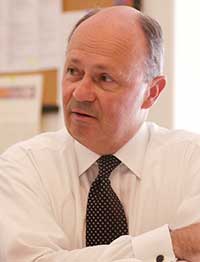 Dean Emeritus and Professor of Law Donald Polden is a leading authority on leadership education and development of lawyers and law students in the United States. He is also a demonstrated leader serving as Dean of two major law schools from 1993 to 2013 and in leading a major national legal education committee for several years. Following service as dean, Don resumed full time teaching and production of scholarship, especially in the areas of leadership development, professional identity formation of law students and new lawyers, and lawyering skills and competencies.
Dean Emeritus and Professor of Law Donald Polden is a leading authority on leadership education and development of lawyers and law students in the United States. He is also a demonstrated leader serving as Dean of two major law schools from 1993 to 2013 and in leading a major national legal education committee for several years. Following service as dean, Don resumed full time teaching and production of scholarship, especially in the areas of leadership development, professional identity formation of law students and new lawyers, and lawyering skills and competencies.
He graduated from The George Washington University and Indiana University School of Law. During law school, he wrote for the Indiana Law Review and clerked on the state court of appeals and for a non-profit public interest law firm. Following a federal clerkship, he practiced antitrust law in Des Moines, Iowa, including 5 federal jury trials and appellate litigation in the U.S. Courts of Appeal and the United States Supreme Court.
Don has been teaching leadership for lawyers’ classes for more than a decade and is a frequent speaker on leadership and the legal profession. He is the author of law review articles on lawyer leadership that have been published in the Santa Clara Law Review, the Hofstra Law Review, the Tennessee Law Review and the Tennessee Journal of Law and Policy. He has also co-authored books on leadership in sports organizations and leading the compliance functions in major corporate legal departments.
Don created and leads Santa Clara’s Institute for Lawyer Leadership Education which has conducted several national conferences and workshops on educating lawyers and students in leadership in the legal profession. He was instrumental in launching a new Section on Leadership for the Association of American Law Schools and was recently elected to the position of Chair Elect (2020-21) for the section.
 Jacob H. Rooksby was appointed Dean of Gonzaga University School of Law in June 2018. He also holds a joint appointment as a tenured Professor of Law and Professor of Leadership Studies. Prior to joining Gonzaga, Dean Rooksby was Associate Professor and Associate Dean at Duquesne University School of Law, where he taught Torts I and Torts II, among other courses. While on the faculty at Duquesne, Dean Rooksby was Of Counsel to the intellectual property (IP) practice group at Cohen & Grigsby, P.C. in Pittsburgh and served as an expert witness in IP litigation.
Jacob H. Rooksby was appointed Dean of Gonzaga University School of Law in June 2018. He also holds a joint appointment as a tenured Professor of Law and Professor of Leadership Studies. Prior to joining Gonzaga, Dean Rooksby was Associate Professor and Associate Dean at Duquesne University School of Law, where he taught Torts I and Torts II, among other courses. While on the faculty at Duquesne, Dean Rooksby was Of Counsel to the intellectual property (IP) practice group at Cohen & Grigsby, P.C. in Pittsburgh and served as an expert witness in IP litigation.
Dean Rooksby’s scholarship lies in two fields: IP law and higher education law. He published a book with Johns Hopkins University Press in 2016, The Branding of the American Mind: How Universities Capture, Manage, and Monetize Intellectual Property and Why It Matters. He also is co-author of the 6th edition of The Law of Higher Education, the leading treatise in the field. His edited book at the intersection of IP and higher education, Research Handbook on Intellectual Property and Technology Transfer, was published by Edward Elgar in 2020.
Upon earning his J.D. from the University of Virginia, Dean Rooksby joined McGuireWoods LLP in Richmond, Virginia, practicing in the firm’s IP litigation group and as a member of its higher education practice team. In addition to his law degree, he also holds M.Ed. (Social Foundations of Education) and Ph.D. (Higher Education) degrees from the University of Virginia. Dean Rooksby earned his undergraduate degree, summa cum laude, in Hispanic Studies and Government from the College of William & Mary, where he was inducted into Phi Beta Kappa. He is an elected member of the American Law Institute and has completed post-graduate training in higher education leadership and management at Harvard University. Dean Rooksby is licensed to practice law in Pennsylvania, Virginia, and Washington.
 Aric Short is Professor of Law and Director of the Professionalism and Leadership Program at Texas A&M University School of Law. In addition to regularly teaching Torts and Property, Aric teaches all 1L students Professional Identity—a year-long course focusing on identity formation. He also oversees upper-level programming related to professionalism and leadership, including Next Gen Aggies, a professional identity series aimed primarily at first gen law students and a new leadership certificate in the Fall of 2021. Aric has also served in the law school’s administration as Associate Dean for Academic Affairs, Interim Dean, and Vice Dean. He has won multiple teaching awards, and his scholarship has been published in the Alabama Law Review, the Hastings Law Journal, the Northeastern University Law Review, the Nebraska Law Review, and the N.Y.U. Journal of International Law and Politics.
Aric Short is Professor of Law and Director of the Professionalism and Leadership Program at Texas A&M University School of Law. In addition to regularly teaching Torts and Property, Aric teaches all 1L students Professional Identity—a year-long course focusing on identity formation. He also oversees upper-level programming related to professionalism and leadership, including Next Gen Aggies, a professional identity series aimed primarily at first gen law students and a new leadership certificate in the Fall of 2021. Aric has also served in the law school’s administration as Associate Dean for Academic Affairs, Interim Dean, and Vice Dean. He has won multiple teaching awards, and his scholarship has been published in the Alabama Law Review, the Hastings Law Journal, the Northeastern University Law Review, the Nebraska Law Review, and the N.Y.U. Journal of International Law and Politics.
 Ann Skeet joined the Markkula Center for Applied Ethics at Santa Clara University, the Jesuit university in Silicon Valley, as its senior director of leadership ethics in 2014. She researches, writes, and speaks about the ethical dilemmas of leaders and followers, corporate culture, and the ethical challenges of governance and works with executives to shape and reinforce organizational cultures that encourage ethical outcomes. She uses tools such as a model for The Practice of Ethical Leadership, a Culture Self-Assessment Practice, and a culture change management model to help leaders understand, discuss, and positively influence their cultures and business practices.
Ann Skeet joined the Markkula Center for Applied Ethics at Santa Clara University, the Jesuit university in Silicon Valley, as its senior director of leadership ethics in 2014. She researches, writes, and speaks about the ethical dilemmas of leaders and followers, corporate culture, and the ethical challenges of governance and works with executives to shape and reinforce organizational cultures that encourage ethical outcomes. She uses tools such as a model for The Practice of Ethical Leadership, a Culture Self-Assessment Practice, and a culture change management model to help leaders understand, discuss, and positively influence their cultures and business practices.
Skeet is a member of the steering committee for the Responsible Use of Technology at the World Economic Forum’s Centre for the 4th Industrial Revolution and the Partnership on AI’s Working Group on AI, Labor and the Economy. She launched a social sector ethics program and led development of a customized version of Standards for Excellence, a national code of ethics and accountability for the nonprofit sector, using the Center’s Framework for Ethical Decision Making. She writes about issues facing leaders across sectors regularly for her blog, Benison: The Practice of Ethical Leadership, and other media outlets, and is a frequent media commentator.
Ann graduated magna cum laude from Bucknell University and was elected to Phi Beta Kappa. She holds a master of business administration degree from Harvard Business School and spent her early career working in an outside plant for C&P Telephone Company (now Verizon) in the Washington, D.C. area.
 D. Gordon Smith is Dean and Woodruff J. Deem Professor of Law of the BYU Law School. As a scholar, Dean Smith is a leading figure in the field of law and entrepreneurship and has done foundational work on fiduciary theory. For his work in promoting the study of corpus linguistics and design thinking in law schools (including co-founding LawX, BYU’s legal design clinic), Dean Smith was included in the 2017 class of Fastcase 50, which honors “the law’s smartest, most courageous innovators, techies, visionaries, & leaders.”
D. Gordon Smith is Dean and Woodruff J. Deem Professor of Law of the BYU Law School. As a scholar, Dean Smith is a leading figure in the field of law and entrepreneurship and has done foundational work on fiduciary theory. For his work in promoting the study of corpus linguistics and design thinking in law schools (including co-founding LawX, BYU’s legal design clinic), Dean Smith was included in the 2017 class of Fastcase 50, which honors “the law’s smartest, most courageous innovators, techies, visionaries, & leaders.”
Serving as the head of BYU Law since 2016, Dean Smith has established the Inspiring Leadership Initiative, which includes leadership courses, a leadership colloquium, an annual leadership conference, the leadership study tour, leadership scholarships, and an alumni leadership council. The Initiative also motivated the creation of a first-year professional development program (Milestones) and BYU LawStories, an innovative storytelling program.
Both within and beyond the Law School, Dean Smith is an advocate for vulnerable populations. As dean, he has supported the creation and development of BYU Law’s Refugee and Immigration Initiative and the Community Law Clinic. At the invitation of the Utah Supreme Court, Dean Smith has been part of an effort to narrow the access-to-justice gap in Utah by proposing the establishment of the Utah Office of Legal Services Innovation to oversee nontraditional legal services and providers. Dean Smith also advocated for recent law school graduates before the Utah Supreme Court, which granted the diploma privilege in April 2020, providing an early spur to the national debate over law licensure.
Dean Smith earned a JD from the University of Chicago Law School and a BS in Accounting from Brigham Young University. He has taught at six law schools in the U.S., as well as law programs in Australia, China, England, Finland, France, Germany, and Hong Kong. Before entering academe, Professor Smith clerked for Judge W. Eugene Davis in the United States Court of Appeals for the Fifth Circuit and was an associate in the Delaware office of the international law firm Skadden, Arps, Slate, Meagher & Flom.
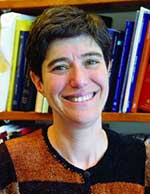 Susan P. Sturm‘s work focuses on inequality, discrimination, remedying racial and gender bias, criminal justice reform, lawyer-leadership, and the role education can play in creating social change and a more inclusive world. Sturm is a co-chair and architect of Columbia Law School’s Davis Polk Leadership Initiative, a cross-disciplinary effort to prepare students to succeed as leaders in a wide range of sectors. She is the founding director of the Center for Institutional and Social Change, and a Provost Senior Faculty Teaching Scholar. She received Columbia University’s Presidential Teaching Award in 2007. Sturm has written and spoken extensively about race, gender, legal education, and full participation in higher education and filed an amicus brief with the Supreme Court in support of the University of Texas in a case challenging its race-conscious admissions process.
Susan P. Sturm‘s work focuses on inequality, discrimination, remedying racial and gender bias, criminal justice reform, lawyer-leadership, and the role education can play in creating social change and a more inclusive world. Sturm is a co-chair and architect of Columbia Law School’s Davis Polk Leadership Initiative, a cross-disciplinary effort to prepare students to succeed as leaders in a wide range of sectors. She is the founding director of the Center for Institutional and Social Change, and a Provost Senior Faculty Teaching Scholar. She received Columbia University’s Presidential Teaching Award in 2007. Sturm has written and spoken extensively about race, gender, legal education, and full participation in higher education and filed an amicus brief with the Supreme Court in support of the University of Texas in a case challenging its race-conscious admissions process.
At the Center for Institutional and Social Change, which she founded in 2007, Sturm leads collaborative action research projects with institutional and community leaders in the areas of education, criminal justice, and community development. She collaborates with a wide variety of higher education, government, and community-based organizations including the Massachusetts Trial Courts, the Center for Justice, the Aspen Ascend Network, Hostos Community College, and JustLeadershipUSA. She is the co-creator of Theaters of Change, a joint effort with the Center for Institutional and Social Change and the Broadway Advocacy Coalition to bring together individuals directly impacted by mass incarceration, high-level theater artists, and advocates and policymakers focused on humanizing and transforming the criminal legal system.
Sturm is the principal investigator for a grant from the Commonwealth of Massachusetts and has developed a curriculum for building leadership capacity to address race and bias in the Massachusetts Trial Courts. She has served as the principal investigator on two Ford Foundation grants for projects designed to increase access to postsecondary education for immigrants, veterans, and communities affected by incarceration. She also received an Aspen Ascend grant to develop multigenerational strategies for advancing higher education for communities affected by the criminal justice system.
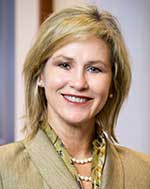 Associate Dean Leah W. Teague’s 30-year tenure as an associate dean is unique in law school academe, especially at the same law school. With the average tenure at most other law schools of three to six years, she explains her longevity, “I love Baylor Law and I believe in our mission. Baylor Law is a very special place. Baylor is rich in the tradition of faculty and staff who love what they do here and choose to stay. Dean Toben and I are in our 30th year working together for the law school and we have an incredible faculty who are just as committed as we are to our first priority—teaching and training the next generation of Baylor Lawyers who will serve their clients and communities with honor and integrity.”
Associate Dean Leah W. Teague’s 30-year tenure as an associate dean is unique in law school academe, especially at the same law school. With the average tenure at most other law schools of three to six years, she explains her longevity, “I love Baylor Law and I believe in our mission. Baylor Law is a very special place. Baylor is rich in the tradition of faculty and staff who love what they do here and choose to stay. Dean Toben and I are in our 30th year working together for the law school and we have an incredible faculty who are just as committed as we are to our first priority—teaching and training the next generation of Baylor Lawyers who will serve their clients and communities with honor and integrity.”
Dean Teague graduated from Baylor Law with a J.D., cum laude, after completing her B.B.A., summa cum laude, in accounting at Baylor. Before joining the Baylor Law faculty, she practiced law in the business section of the law firm of Naman Howell Smith & Lee, P.C. After joining the Baylor Law faculty, she became the primary tax professor and then associate dean and tax professor. Still serving as associate dean, but more recently focused on leadership development for lawyers to help her students and lawyers understand lawyers’ obligation to contribute to society in meaningful ways and to better equip them for the opportunities they will have to positively influence and impact their clients and communities.
Dean Teague is very active in professional and charitable organizations on a local, state, and national basis. She writes and speaks on tax, business, non-profit and leadership topics.
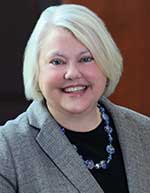 Kellye Y. Testy is president and chief executive officer of the Law School Admission Council, a position she has held since 2017. Testy joined LSAC after an eight-year term as the first woman dean of the University of Washington School of Law. Prior to that, she was a professor and dean at Seattle University School of Law. Testy founded numerous programs at both schools while earning recognition as the nation’s second most influential leader in legal education by National Jurist. In addition to her role at LSAC, Testy is currently an adjunct professor of law at George Mason University, Antonin Scalia Law School.
Kellye Y. Testy is president and chief executive officer of the Law School Admission Council, a position she has held since 2017. Testy joined LSAC after an eight-year term as the first woman dean of the University of Washington School of Law. Prior to that, she was a professor and dean at Seattle University School of Law. Testy founded numerous programs at both schools while earning recognition as the nation’s second most influential leader in legal education by National Jurist. In addition to her role at LSAC, Testy is currently an adjunct professor of law at George Mason University, Antonin Scalia Law School.
A nationally sought-after speaker on diversity and access in legal and higher education, Testy is a member of the American Law Institute and serves on the boards of the Washington Law Institute and LSSSE. She has served on the Board of Governors of the Society of American Law Teachers, as president and in other roles for the Association of American Law Schools, and on committees and initiatives of the American Bar Association Section on Legal Education.
Testy is a first-generation college graduate who earned her journalism and law degrees from Indiana University, in her hometown of Bloomington, where she was editor-in-chief of the Indiana Law Journal and graduated summa cum laude from IU Maurer School of Law. After graduating, Testy clerked for Judge Jesse E. Eschbach, U.S. Court of Appeals for the Seventh Circuit.
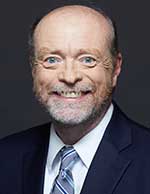 William M. Treanor is the Dean and Executive Vice President of Georgetown University Law Center. He joined Georgetown in 2010 and was reappointed to serve a third term beginning July 1, 2020. Under Treanor’s leadership, Georgetown Law has hired 47 new tenure or tenure-track faculty members; expanded the number of experiential offerings for students from 450 to more than 3200 seats across the clinical, externship, practicum, and simulation programs; more than doubled financial aid; and experienced its most successful era of fundraising, culminating in nearly $33 million in giving in 2020. In 2012, he was recognized by the National Law Journal as a “Champion” because of his work to “uphold the profession’s core values,” and National Jurist magazine has named him one of the most influential people in legal education four times. Most recently, he was elected into the American Academy of Arts & Sciences for law as part of its 2020 class of new members. His areas of expertise include constitutional law, property, criminal law, intellectual property, and legal history, and he was recognized as one of the 10 most-cited legal history scholars in the United States by the University of Chicago Law School’s Brian Leiter. At Georgetown Law, he has taught a first-year legal justice seminar, an upper-level course on the drafting of the U.S. Constitution, and most recently leadership courses. Before coming to Georgetown, Treanor was Dean and Paul Fuller Professor of Law at Fordham Law School, where he began teaching in 1991. Treanor has a Ph.D. in history from Harvard University, a J.D. from Yale Law School, and a B.A. from Yale College (summa cum laude).
William M. Treanor is the Dean and Executive Vice President of Georgetown University Law Center. He joined Georgetown in 2010 and was reappointed to serve a third term beginning July 1, 2020. Under Treanor’s leadership, Georgetown Law has hired 47 new tenure or tenure-track faculty members; expanded the number of experiential offerings for students from 450 to more than 3200 seats across the clinical, externship, practicum, and simulation programs; more than doubled financial aid; and experienced its most successful era of fundraising, culminating in nearly $33 million in giving in 2020. In 2012, he was recognized by the National Law Journal as a “Champion” because of his work to “uphold the profession’s core values,” and National Jurist magazine has named him one of the most influential people in legal education four times. Most recently, he was elected into the American Academy of Arts & Sciences for law as part of its 2020 class of new members. His areas of expertise include constitutional law, property, criminal law, intellectual property, and legal history, and he was recognized as one of the 10 most-cited legal history scholars in the United States by the University of Chicago Law School’s Brian Leiter. At Georgetown Law, he has taught a first-year legal justice seminar, an upper-level course on the drafting of the U.S. Constitution, and most recently leadership courses. Before coming to Georgetown, Treanor was Dean and Paul Fuller Professor of Law at Fordham Law School, where he began teaching in 1991. Treanor has a Ph.D. in history from Harvard University, a J.D. from Yale Law School, and a B.A. from Yale College (summa cum laude).
Speaker Articles and Outlines:
Susan Jones – Leadership Coaching
Aric Short – Stealth Leadership Training for 1Ls
